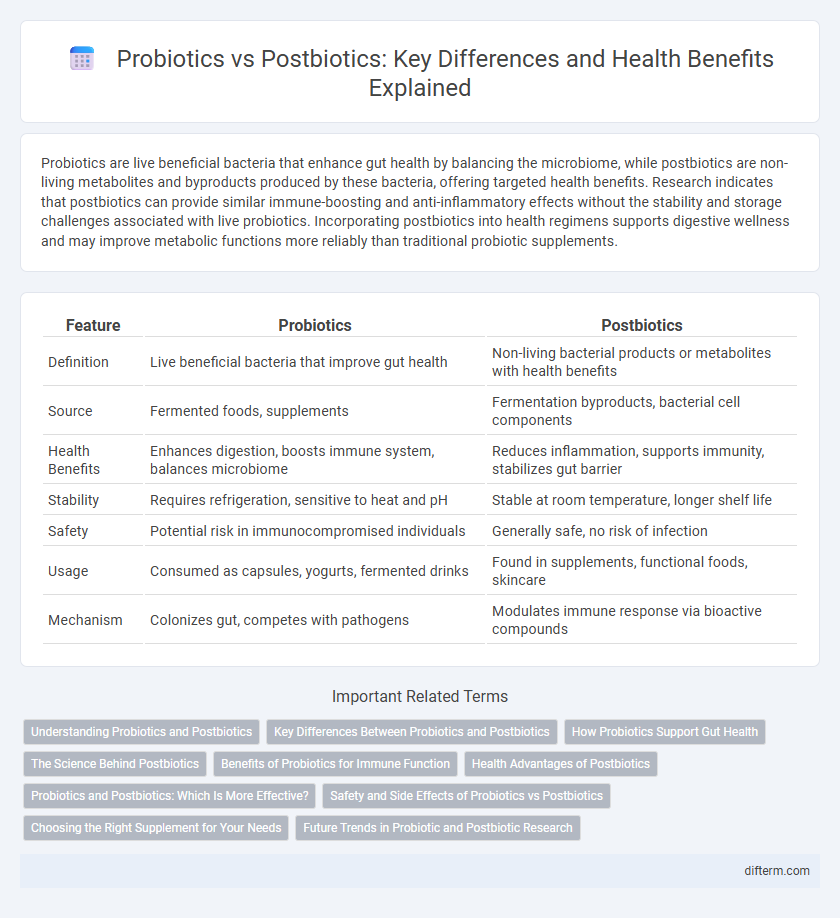Probiotics are live beneficial bacteria that enhance gut health by balancing the microbiome, while postbiotics are non-living metabolites and byproducts produced by these bacteria, offering targeted health benefits. Research indicates that postbiotics can provide similar immune-boosting and anti-inflammatory effects without the stability and storage challenges associated with live probiotics. Incorporating postbiotics into health regimens supports digestive wellness and may improve metabolic functions more reliably than traditional probiotic supplements.
Table of Comparison
| Feature | Probiotics | Postbiotics |
|---|---|---|
| Definition | Live beneficial bacteria that improve gut health | Non-living bacterial products or metabolites with health benefits |
| Source | Fermented foods, supplements | Fermentation byproducts, bacterial cell components |
| Health Benefits | Enhances digestion, boosts immune system, balances microbiome | Reduces inflammation, supports immunity, stabilizes gut barrier |
| Stability | Requires refrigeration, sensitive to heat and pH | Stable at room temperature, longer shelf life |
| Safety | Potential risk in immunocompromised individuals | Generally safe, no risk of infection |
| Usage | Consumed as capsules, yogurts, fermented drinks | Found in supplements, functional foods, skincare |
| Mechanism | Colonizes gut, competes with pathogens | Modulates immune response via bioactive compounds |
Understanding Probiotics and Postbiotics
Probiotics are live microorganisms that provide health benefits by enhancing gut microbiota balance, while postbiotics are bioactive compounds produced during probiotic fermentation offering anti-inflammatory and immune-boosting properties. Health studies emphasize that postbiotics can support gut barrier function and reduce pathogens without the viability challenges faced by probiotics. Integrating both probiotics and postbiotics in dietary strategies optimizes digestive health and systemic immunity through complementary biological mechanisms.
Key Differences Between Probiotics and Postbiotics
Probiotics are live beneficial bacteria that colonize the gut to enhance digestive health and immune function, while postbiotics are non-living metabolic byproducts produced by these bacteria that exert health benefits without the need for live organisms. Key differences include probiotics' need to survive the gastrointestinal tract to be effective, whereas postbiotics offer stability, longer shelf life, and reduced risk of infection, making them advantageous for individuals with compromised immune systems. Both contribute to gut health but operate through distinct mechanisms: probiotics restore microbial balance, while postbiotics modulate immune responses and intestinal barrier function.
How Probiotics Support Gut Health
Probiotics consist of live beneficial bacteria that enhance gut health by restoring the natural balance of the microbiota, improving digestion, and boosting the immune system. These live microorganisms produce enzymes and short-chain fatty acids that nourish intestinal cells and inhibit pathogenic bacteria. Maintaining a diverse probiotic population supports nutrient absorption and reduces inflammation, contributing to overall gastrointestinal well-being.
The Science Behind Postbiotics
Postbiotics are bioactive compounds produced during the fermentation process by probiotics, including metabolites like short-chain fatty acids, enzymes, and peptides that confer health benefits. Unlike probiotics, which consist of live bacteria, postbiotics are non-viable microbial products that modulate the gut microbiota and immune response through anti-inflammatory and antioxidant effects. Scientific studies demonstrate that postbiotics support gut barrier function, reduce pathogenic bacteria, and enhance metabolic regulation, making them a promising therapeutic strategy in digestive and systemic health.
Benefits of Probiotics for Immune Function
Probiotics enhance immune function by promoting the growth of beneficial gut bacteria, which helps regulate the body's immune response and reduce inflammation. Clinical studies show that probiotics increase the production of natural antibodies and stimulate immune cells like T lymphocytes and macrophages. Regular intake of probiotics is linked to decreased incidence of respiratory infections and improved gut barrier integrity, supporting overall immune health.
Health Advantages of Postbiotics
Postbiotics offer significant health advantages by enhancing gut barrier function and modulating the immune response more consistently than probiotics. Unlike probiotics, postbiotics are non-viable microbial cells or metabolic byproducts that provide anti-inflammatory effects and support digestive health without risk of infection. Research demonstrates that incorporating postbiotics can improve nutrient absorption, reduce gastrointestinal discomfort, and promote a balanced microbiome.
Probiotics and Postbiotics: Which Is More Effective?
Probiotics are live microorganisms that support gut health by enhancing the balance of beneficial bacteria, while postbiotics are non-living metabolic byproducts of probiotics that offer immune, anti-inflammatory, and antimicrobial benefits. Clinical studies suggest probiotics may be more effective for improving digestive conditions such as irritable bowel syndrome (IBS) and antibiotic-associated diarrhea by actively repopulating the gut microbiota. Postbiotics provide a more stable, shelf-friendly alternative with targeted health effects, but probiotics tend to deliver broader gut microbiome improvements essential for long-term health.
Safety and Side Effects of Probiotics vs Postbiotics
Probiotics, live microorganisms often used to improve gut health, may cause mild digestive issues, such as bloating or gas, particularly in immunocompromised individuals. Postbiotics, which are non-living microbial byproducts, generally exhibit a safer profile with fewer reported adverse effects due to the absence of live organisms that could potentially cause infections. Clinical studies highlight postbiotics as a promising alternative for sensitive populations, offering health benefits with reduced safety concerns compared to probiotics.
Choosing the Right Supplement for Your Needs
Probiotics contain live beneficial bacteria that enhance gut flora balance and support digestive health, while postbiotics refer to the metabolic byproducts of these bacteria, offering anti-inflammatory and immune-boosting benefits without requiring live organisms. Selecting the right supplement depends on individual health goals, such as targeting gut microbiota diversity with probiotics or focusing on inflammation reduction with postbiotics. Understanding specific strains and their functions within probiotics compared to the bioactive compounds in postbiotics ensures optimized supplementation tailored to personal digestive and immune system needs.
Future Trends in Probiotic and Postbiotic Research
Emerging research in probiotics and postbiotics highlights the potential for personalized microbiome therapies tailored to individual genetic and microbial profiles. Advances in metagenomics and metabolomics are driving innovations that enhance the efficacy and specificity of probiotic strains and postbiotic compounds. Integration of artificial intelligence in microbiome data analysis is expected to accelerate discovery of novel bioactive molecules with targeted health benefits.
probiotics vs postbiotics Infographic

 difterm.com
difterm.com